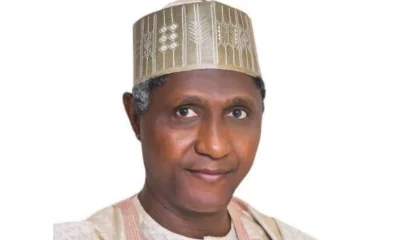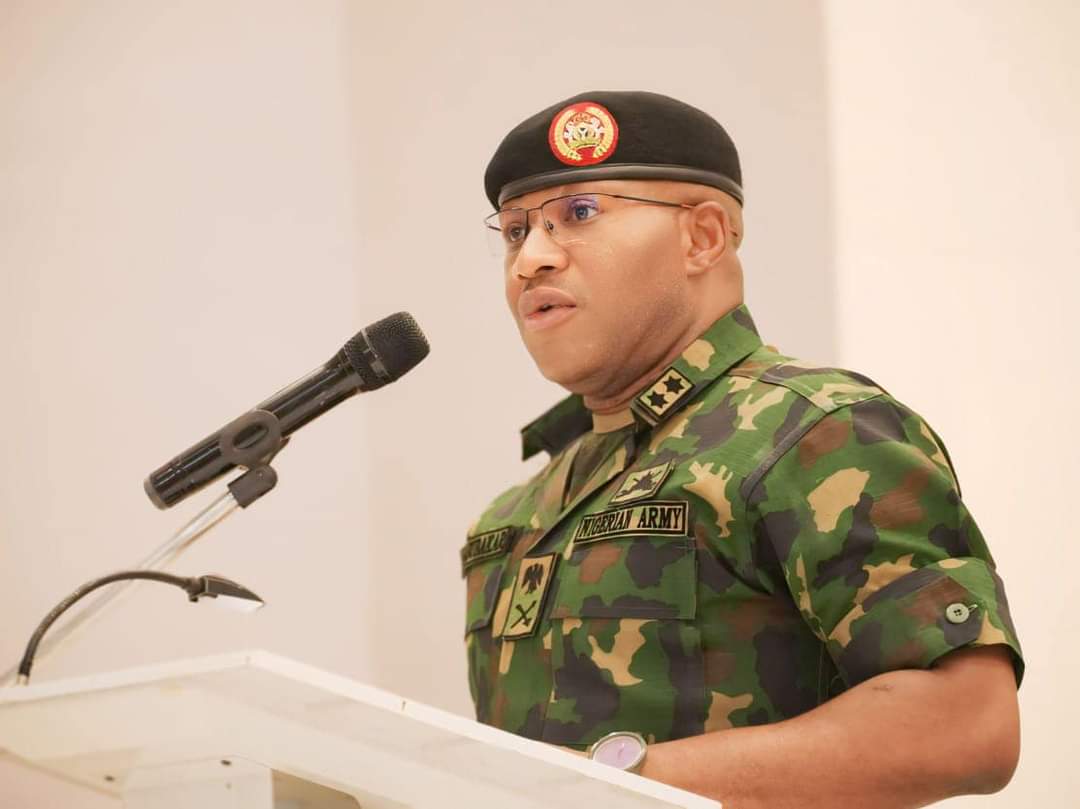Defence
Army moves to enhance safety, efficiency of its aviation unit

The Nigerian Army Aviation has taken steps to enhance safety and efficiency of its operations in ensuring effective and timely responses to emergencies and army operations.
The Chief of Training (Army), Maj.-Gen. Sani Mohammed, made this known during a three-day Workshop with theme: “Exploring the Critical Roles of Human Factors in Aviation Emergency Response Procedure” on Monday in Abuja.
Mohammed was represented by the Deputy Chief of Training, and Exercises, Maj.-Gen. Musa Etsu-Ndagi.
According to him, in the complex and hectic environment of aviation, the roles of human factors, from pilots, aircraft engineers, air traffic controllers, to other support ground crew and emergency responders, cannot be overstated.,
He said that the performance and well-being of Nigerian army aviation personnel were crucial in ensuring effective and timely responses to emergencies.
“Understanding our human behaviour, decision-making, and teamwork impact our procedures can significantly improve outcomes in crisis situations.
“Today, we gather here to share insights, best practices, and innovative approaches to integrating human factors in our emergency response strategies.
“The Nigerian army’s goal is to foster a collaborative environment where we can learn from each other’s experiences and advance our collective capabilities.
“Your active participation underscores the collective dedication to the safety and efficiency of Nigerian army operations,’’ he said.
Mohammed said that the commitment to excellence in aviation safety and emergency response was a shared responsibility towards enhancing readiness and resilience and ultimately safeguarding lives.
He thanked the Chief of Army Staff (COAS), Lt.-Gen. Taoreed Lagbaja, for his unwavering commitment and dedication towards the operationalisation of army aviation.
He also challenged participants to use the workshop as an opportunity to foster greater synergy among all stakeholders and chart a clear path towards a more capable and effective Nigerian army aviation.
The Coordinator of Nigerian Army Aviation, Brig.-Gen. Musa Alkali, said aviation was a profession that operates in an environment where precision, discipline and rapid response are critical.
Alkali said that human element often plays a decisive role in the outcome of our emergency situations, adding that a combination of factors could turn a potential disaster into a successful managed situation.
According to him, the ability to make quick, informed decisions under pressure, the coordination between various teams and the understanding of human limitation and strength are the factors.
He said the event was to help them to delve deeper into the human factors that influence responses, and understanding how stress, fatigue, communication and teamwork impact decision-making during emergencies.
“It is this understanding that will enable us to refine our procedures, train our personnel more efficiently and ultimately ensure the highest standard of safety.
“As Nigerian Army professionals, we are acutely aware of the importance of preparedness and the need for continuous improvement in our operations.
“The lessons we learn here today, will not only benefit our own procedures, but also contribute to the broader aviation community, helping to create a safer environment for all who rely on air travel.
Defence
Shettima Leads Nation to Honour Fallen Heroes at 2025 Armed Forces Remembrance Day

Vice President Kashim Shettima on Wednesday led a distinguished delegation, including Senate President Godswill Akpabio, members of the Federal Executive Council, National Assembly, service chiefs, and the diplomatic corps, to pay tribute to the nation’s fallen and living heroes.
The solemn occasion, held at the National Arcade in Abuja, featured a wreath-laying ceremony marking the climax of the 2025 Armed Forces Celebration and Remembrance Day (AFCRD).
Vice President Shettima was the first to lay a wreath, followed by Senate President Akpabio, Deputy Speaker of the House of Representatives Benjamin Kalu (representing Speaker Tajudeen Abbas), and Chief Justice of Nigeria Justice Kudirat Kerere-Ekun.
Other participants in the ceremony included Minister of Defence Muhammed Badaru, Minister of the Federal Capital Territory Nyesom Wike, Minister of State for Defence Bello Matawalle, and service chiefs led by the Chief of Defence Staff, Gen. Christopher Musa. The Inspector-General of Police, Kayode Egbetokun, also joined in paying respects.
Representatives of the diplomatic corps, the Nigerian Legion, and widows of fallen soldiers, led by Veronica Aluko, President of the Military Widows Association (MIWA), also laid wreaths to honour the heroes.
A traditional military salute followed, with the firing of three volleys, a symbolic act rooted in the age-old battlefield custom of pausing hostilities to retrieve the fallen.
The Vice President capped the event by signing the anniversary register and releasing ceremonial white pigeons, symbolizing peace and freedom.
The week-long celebration began on January 10 with a Jumma’at prayer at the National Mosque, followed by an interdenominational Christian service on January 12. Other highlights included a social and awards evening for military personnel, a regimental dinner and awards night for officers, and a lecture and art exhibition hosted by Defence Headquarters.
This year, the celebration, renamed Armed Forces Celebration and Remembrance Day, aims to honour both fallen heroes and serving personnel for their dedication to national peace and security.
Observed annually on January 15 in Nigeria, the day commemorates those who sacrificed their lives in global conflicts, including the First and Second World Wars, the Nigerian Civil War, peacekeeping missions, and internal security operations. It also serves as a platform to honour veterans and garner support for the families of the fallen.
As Vice President Shettima noted during the event, “Their sacrifices remind us of the cost of freedom and the unwavering commitment required to preserve our nation’s unity and peace.”
Defence
Armed Forces Remembrance Day: Makinde Reaffirms Commitment to Fallen Heroes’ Families

Gov. Seyi Makinde of Oyo State has reiterated his administration’s unwavering support for widows and children of fallen heroes, as well as the welfare of vulnerable ex-servicemen.
The governor made this pledge during the grand finale of the Armed Forces Remembrance Day celebration, held on Wednesday at the Arcade, Government House, Agodi, Ibadan.
Makinde emphasized that the state government would prioritize the welfare of those who had sacrificed for the nation’s unity and security.
“The fallen heroes paid the supreme price to ensure the country remained one, safe, and secure,” Makinde said.
He also commended the service commanders, officers, and men of all security agencies operating in the state for their dedication to maintaining peace and fostering economic growth.
“They are supporting this administration to maintain an environment where economic activities can thrive,” he added.
The chairman of the Nigerian Legion, Oyo State Command, Julius Ogunkojo, called on the government to address the needs of officers and men of the armed forces. He also appealed to well-meaning Nigerians to assist ex-servicemen in achieving better living standards.
The event featured the symbolic firing of rounds volley, laying of wreaths, and the release of ceremonial pigeons by the governor, symbolizing peace and unity.
The Armed Forces Remembrance Day, celebrated annually, honours the sacrifices of past and present military personnel for the nation’s security and sovereignty.
Aviation
NAF airstrikes destroy terrorist food depot, kill scores in Lake Chad

This is contained in a statement by the Director, Public Relations and Information, Nigerian Air Force (NAF), Air Commodore Olusola Akinboyewa, on Monday in Abuja.
Akinboyewa said the NAF aircraft carried out the operations in Nov. 23 on the strategic location, identified through meticulous intelligence efforts.
He said the location served as a critical food storage site and a sanctuary for terrorist commanders and fighters.
He added that intelligence had previously linked terrorists in the location to recent attacks, including the assault on troops in Kareto on Nov. 16.
According to him, the NAF fighter jets, in response, launched a robust air interdiction mission, destroying identified structures used as storage facilities and neutralising terrorists on-site.
“Mop-up operations using cannons ensured the complete elimination of fleeing hostile elements.
“The operation’s success was made possible by extensive Intelligence, Surveillance, and Reconnaissance (ISR) missions conducted over several days, confirming the presence of active terrorist structures camouflaged under dense vegetation.
“The destruction of the terrorist enclave, including food storage facilities, severely disrupted their logistical operations, while the neutralisation of a significant number of fighters diminished their capacity to launch future attacks,” he said.
Akinboyewa said the mission had demonstrated the NAF’s unwavering commitment to defending our nation and people, acting singly and supporting surface forces in counterterrorism operations.
He reiterated the NAF’s commitment to sustain robust independent and joint operations until all enemies of Nigeria’s prosperity and wellbeing are brought to justice.
-

 Headlines4 years ago
Headlines4 years agoFacebook, Instagram Temporarily Allow Posts on Ukraine War Calling for Violence Against Invading Russians or Putin’s Death
-

 Headlines4 years ago
Headlines4 years agoNigeria, Other West African Countries Facing Worst Food Crisis in 10 Years, Aid Groups Say
-

 Foreign4 years ago
Foreign4 years agoNew York Consulate installs machines for 10-year passport
-

 News1 year ago
News1 year agoZero Trust Architecture in a Remote World: Securing the New Normal
-

 Entertainment3 years ago
Entertainment3 years agoPhyna emerges winner of Big Brother Naija Season 7
-

 Headlines2 years ago
Headlines2 years agoNigeria Customs modernisation project to check extortion of traders
-

 Entertainment2 years ago
Entertainment2 years agoMovie download platform, Netnaija, announces closure
-

 Economy2 years ago
Economy2 years agoWe generated N30.2 bn revenue in three months – Kano NCS Comptroller














